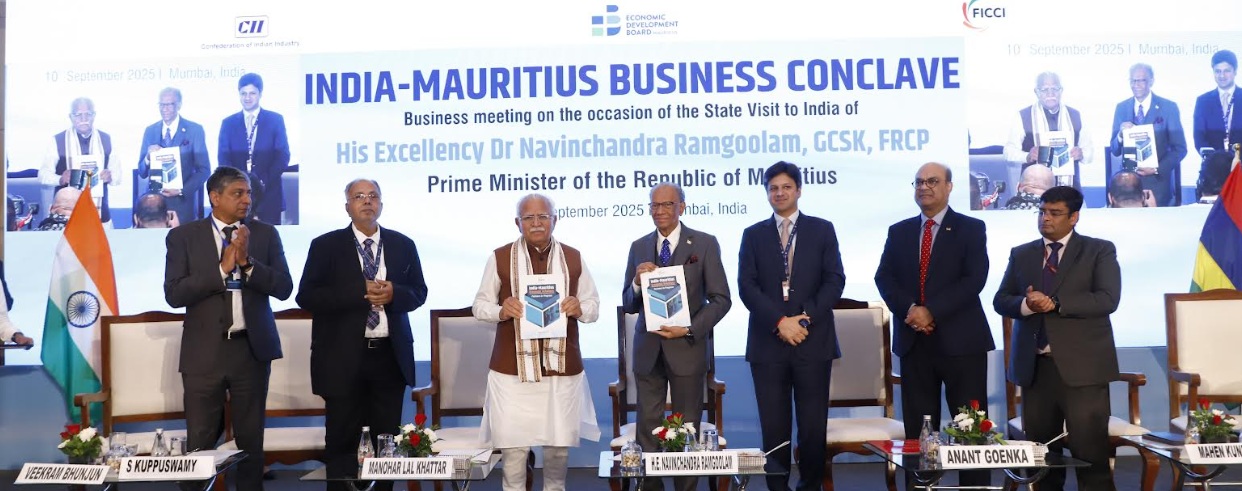India–Mauritius Business Conclave Showcases Strong Economic Partnership

FinTech BizNews Service
Mumbai, 10 September 2025: The India–Mauritius Business Conclave, organised in honour of the official State Visit of Dr Navinchandra Ramgoolam, GCSK, FRCP, Prime Minister of the Republic of Mauritius, brought together senior government leaders, industry representatives, and key stakeholders to reaffirm the deep-rooted partnership between the two nations and explore new pathways for trade and investment.
The Business Conclave, jointly organised by the Federation of Indian Chambers of Commerce & Industry (FICCI), the Confederation of Indian Industry (CII), and the Economic Development Board (EDB) of Mauritius, underscored the historic and cultural bonds that have evolved into a strong strategic and economic partnership.
Dr Navinchandra Ramgoolam, GCSK, FRCP, Prime Minister of the Republic of Mauritius, in his keynote address, reaffirmed the longstanding and strategic nature of bilateral relations, describing them as “time-tested, rooted in shared history, and forward-looking in ambition.” He expressed deep appreciation to FICCI, CII, and EDB for their efforts in strengthening bilateral ties, noting that the Conclave was not only a testament to enduring friendship but also a reflection of a shared vision for sustainable growth. Recalling his earlier visit to FICCI and CII in 2012, he acknowledged the remarkable progress made since then in deepening economic cooperation.
The Prime Minister highlighted historic milestones such as the Double Taxation Avoidance Agreement (DTAA) and the Comprehensive Economic Cooperation and Partnership Agreement (CECPA), describing them as “game-changers” that provide clarity, predictability, and stability to businesses and investment flows. He emphasised that India remains a vital partner for Mauritius, currently its third-largest source of imports and a consistent contributor to its socio-economic development.
The Prime Minister emphasised the country’s preferential access to regional markets such as the African Continental Free Trade Area (AfCFTA), SADC, and COMESA and spoke about how positioning Mauritius as a bridge between Asia and Africa offers Indian businesses a secure and competitive entry point into Africa. He also noted that Mauritius is not only an island nation in the Indian Ocean but also a custodian of a vast maritime zone spanning 2.3 million square kilometres, which anchors its growing role in the ocean economy and marine trade.
He invited the priority sector for collaboration and invited Indian businesses to explore opportunities in the blue economy, including aquaculture and marine infrastructure, as well as in digital transformation, fintech, artificial intelligence, and cybersecurity. He also highlighted the healthcare and medical tourism sectors, renewable energy—with Mauritius targeting 60% of its energy generation from renewables—and real estate and infrastructure, including housing and innovative urban development. The Prime Minister highlighted key milestones, including the Double Taxation Avoidance Agreement (DTAA) and the CECPA, which have created a stable and transparent environment for business. Hedescribed Mauritius as a hub linking Asia and Africa, offering preferential access to regional markets, including the AfCFTA, SADC, and COMESA, and highlighted opportunities in the blue economy, ocean industries, and digital transformation.
“The gateway is open, the platform is secure, the time is now,” said the Prime Minister, reaffirming Mauritius’ readiness to serve as a reliable and competitive partner for Indian business.
The Conclave concluded with a call to action for Indian and Mauritian stakeholders – both public and private – to work hand-in-hand in expanding trade, investment, and technology-driven cooperation. With stability, shared values, and strong institutional support, the India–Mauritius partnership stands poised to enter a new era of collaboration.
Mr Manohar Lal, Union Minister of Power, while describing the relations between India and Mauritius, emphasised the “Heart to Heart” (H2H) connection between India and Mauritius, noting that 70% of the Mauritian population is of Indian origin. He also highlighted India’s key achievements, including being the world’s fourth-largest economy, its third-largest startup ecosystem, its leadership in clean energy and artificial intelligence, and its strong focus on infrastructure and green growth. He pointed to projects such as the India–Mauritius Metro Line as a reflection of enduring bonds.
Mr. Anant Goenka, Senior Vice President, FICCI & Vice Chairman, RPG Group, highlighted Mauritius’ reputation as a safe, stable, and business-friendly destination, and noted that the Comprehensive Economic Cooperation and Partnership Agreement (CECPA) provides a strong framework for expanding trade in goods and services. He also highlighted opportunities in Special Economic Zones, renewable energy, ICT, digital innovation, agribusiness, healthcare, education, tourism, and the blue economy.
Mr Mahen Kundasamy, CEO, Economic Development Board (EDB), Mauritius, highlighted that EDB is committed to making Indian investments in Mauritius not only seamless but also exceptionally rewarding. He highlighted Mauritius’ strengths, including transparent governance, a favourable business environment, knowledge-driven industries, and a skilled workforce.
Mr. Veekram Bhunjun, CEO, Bhunjun Group, in his address, called for deeper collaboration in fintech, AI, cybersecurity, and digital innovation, while also noting opportunities in real estate and housing projects. He invited Indian investors to forge partnerships that will drive shared prosperity.
Mr. S Kuppuswamy, Co-chairman, CII Africa Committee and Special Advisor, Shapoorji Pallonji Group, highlighted Mauritius’ strategic positioning, describing it as an extended territory of India and a natural partner for joint ventures in critical sectors such as ports, digital integration, and logistics.